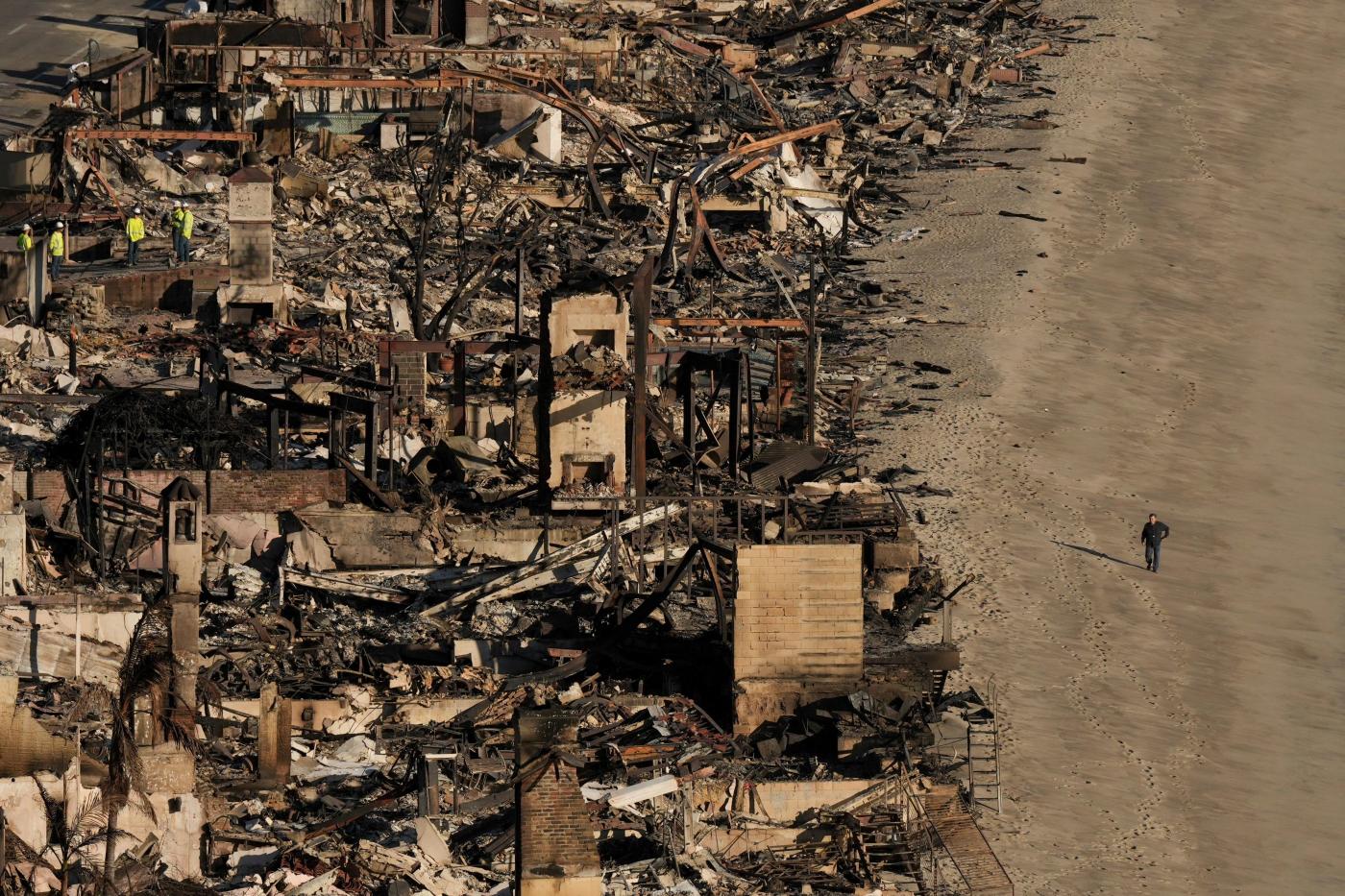As catastrophic wildfires spur insurance companies to raise homeowner premiums and drop thousands of policyholders across California, the industry has blamed climate change for fueling the blazes.
Yet even as insurers sound the alarm about a warming planet, they continue to invest billions of dollars in the oil and gas sector, which scientists identify as the main driver of rising global temperatures as burning fossil fuels releases heat-trapping carbon gases into the atmosphere.
In recent years, lawmakers, environmentalists, consumer advocates and California’s former top insurance regulator have pressed insurers to divest from fossil fuel companies and phase out writing coverage for oil wells, coal mines and other extraction projects. They argue doing so is critical to accelerate a transition toward renewable energy and protect the insurance market from total collapse.
The California Department of Insurance, led by Commissioner Ricardo Lara, said it has no plans to pursue regulation to force insurers to divest. But Lara’s predecessor, Dave Jones, contends that insurance companies investing in fossil fuels “is like pouring gasoline on a wildfire.”
“Insurance companies are telling homeowners and small business owners across the United States they need to increase rates, or simply can’t write or renew insurance coverage,” said Jones, insurance commissioner from 2011 to 2018. “And that’s driven substantially by oil and gas companies.”
Insurers invest the premiums they collect from policyholders into stocks, bonds and other assets to grow profits and maintain sufficient funds to pay customer claims. That’s crucially important following natural disasters such as January’s Los Angeles wildfires, which caused tens of billions of dollars in losses.
Insurance industry officials say carriers hold what they describe as a small portion of assets in oil and gas as part of a diversified investment strategy. They say those investments are no different than those of public pension funds, nonprofit endowments, mutual funds or individual retirement accounts — though some large investors, including the University of California, have moved to divest from traditional energy companies.
“They all have fossil fuels because consumers buy fossil fuels, and it creates a return on investment,” said Seren Taylor, vice president for the Personal Insurance Federation of California, an industry group. Taylor said divestment would jeopardize those returns, which are factored into the premiums insurers charge property owners.
“That’s just asking to raise rates on people,” he said.
In a statement, Jim Stanley, a spokesperson for the Western States Petroleum Association, dismissed calls for divestment as “out-of-touch stunts” that, if implemented, would “kill jobs and increase the cost of living by driving even more insurance and energy companies out of state.”
Since most insurance companies don’t have to publicly report their investment portfolios, it’s unclear how much the industry holds in non-renewable energy assets. However, according to an analysis by S&P Global, the U.S. insurance industry in 2019 invested at least $582 billion in fossil fuels, in turn helping oil and gas companies finance their operations.
California’s largest home insurer, State Farm, this year reported owning at least $113 billion in stocks and equities, according to its latest quarterly disclosure filings with the Securities and Exchange Commission. The company invested almost $6 billion in oil and gas, making up about 5% of its publicly traded equities, a Bay Area News Group analysis of the filings found.
According to the filings, State Farm owns stock in Chevron, Exxon Mobil and Shell, among other fossil fuel-related corporations. The company is required to disclose its stock holdings because it’s considered a large institutional investor.
State Farm did not respond to questions about its fossil fuel investments.
Consumer advocates argue it’s hypocritical for insurers to profit from those investments while citing climate change to raise rates and cancel coverage. They say forcing carriers to divest is a necessary step toward mitigating the wildfire risks now costing policyholders.
“If we get the insurance industry out of the fossil fuels business, we are moving to a more sustainable future, and that will save consumers money,” said Carmen Balber, executive director of Los Angeles-based Consumer Watchdog.
Some experts, meanwhile, say that instead of demanding that insurers sell their stake in fossil fuel companies, advocates and policymakers should focus on modernizing regulations to persuade insurers to expand coverage in fire-prone areas.
“We simply cannot afford to irritate companies that are still in the California insurance market over this kind of thing when we urgently need them to write policies,” Michael Wara, a climate policy researcher with Stanford Law School, said in an email.
Related Articles
New California laws aim to ease ongoing home insurance crisis
AI-powered Bay Area home insurance startup expands in risky markets
‘Ghost networks’: How insurance errors endanger California patients
Check out some wildfire-related bills that Gov. Newsom signed last week
New California law aims to stabilize homeowner insurance for people who can’t get private coverage
Even so, the public pressure appears to be contributing to some insurers’ decision to scale back their exposure to oil and gas holdings, said Michel Léonard, chief economist at the Insurance Information Institute, an industry-backed group.
In recent years, large European insurers, including Allianz and Munich Re, have committed to restricting petroleum investments and their underwriting of extraction projects. In the U.S., State Farm and Farmers — which together account for about a third of homeowner polices in California — have reduced the share of traditional energy investments in their stock portfolios by about half over the past decade, according to the Bay Area News Group analysis.
The analysis found Farmers had $291 million invested in oil and gas stocks, a little over 2% of its equity portfolio. The company did not return a request for comment.
“There’s a concern among almost all actors that these industries aren’t sustainable in the long term,” said Léonard, adding that renewable energy sources are proving increasingly lucrative.
But according to Jones, the former insurance commissioner, that shift isn’t happening fast enough.
He wants to see California and other states follow through on past efforts to require insurers to disclose their fossil fuel holdings. He also urged lawmakers and regulators to compel insurers to transition out of oil and gas investments and underwriting, and clear the way for carriers to sue fossil fuel companies to cover wildfire losses.
Jones said that if the insurers, society’s primary risk managers, exited fossil fuels, other large investors would likely follow, putting pressure on the energy industry to focus on renewables.
“It would send a very strong signal,” he said, “that there’s an important transition underway away from fossil fuels.”





